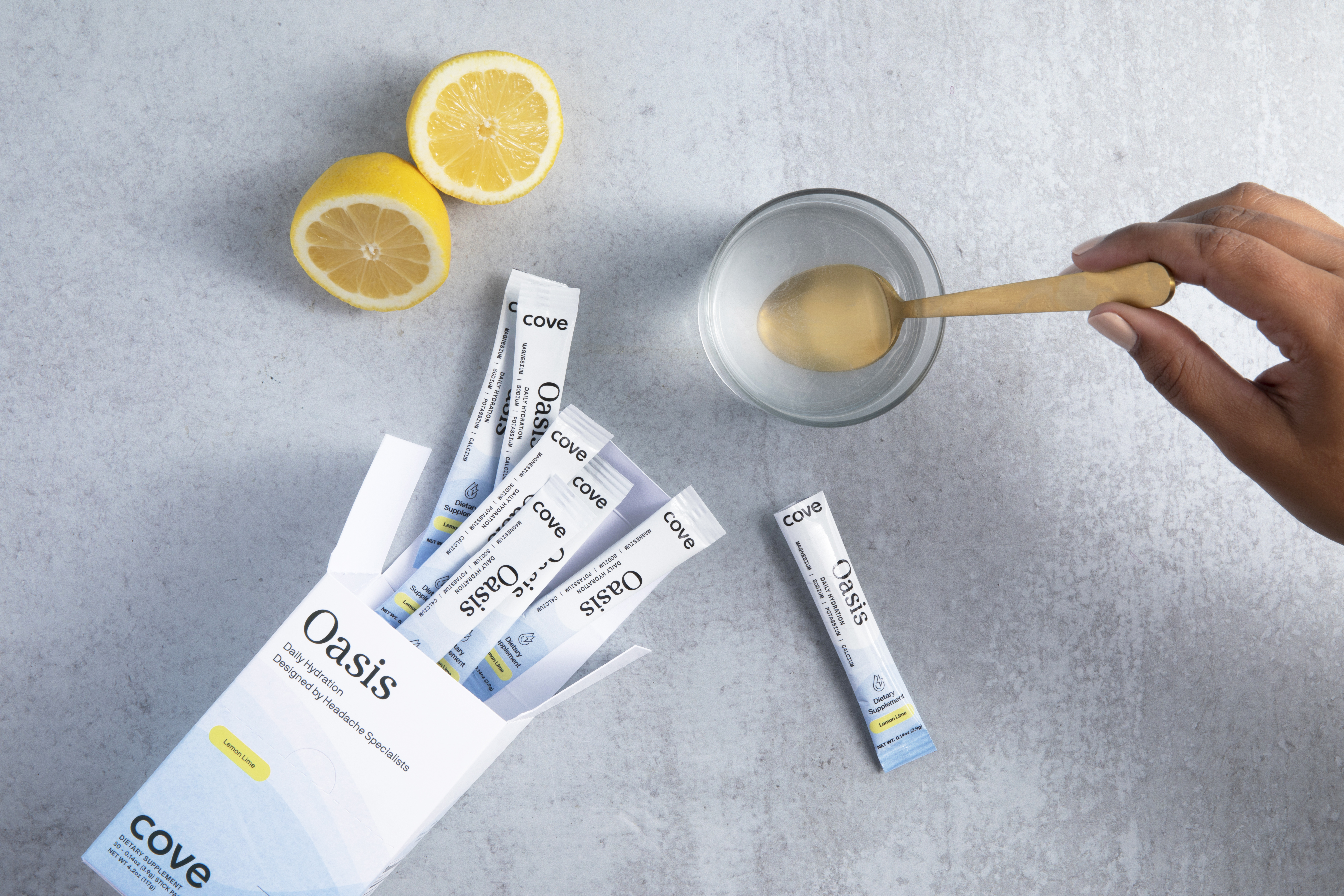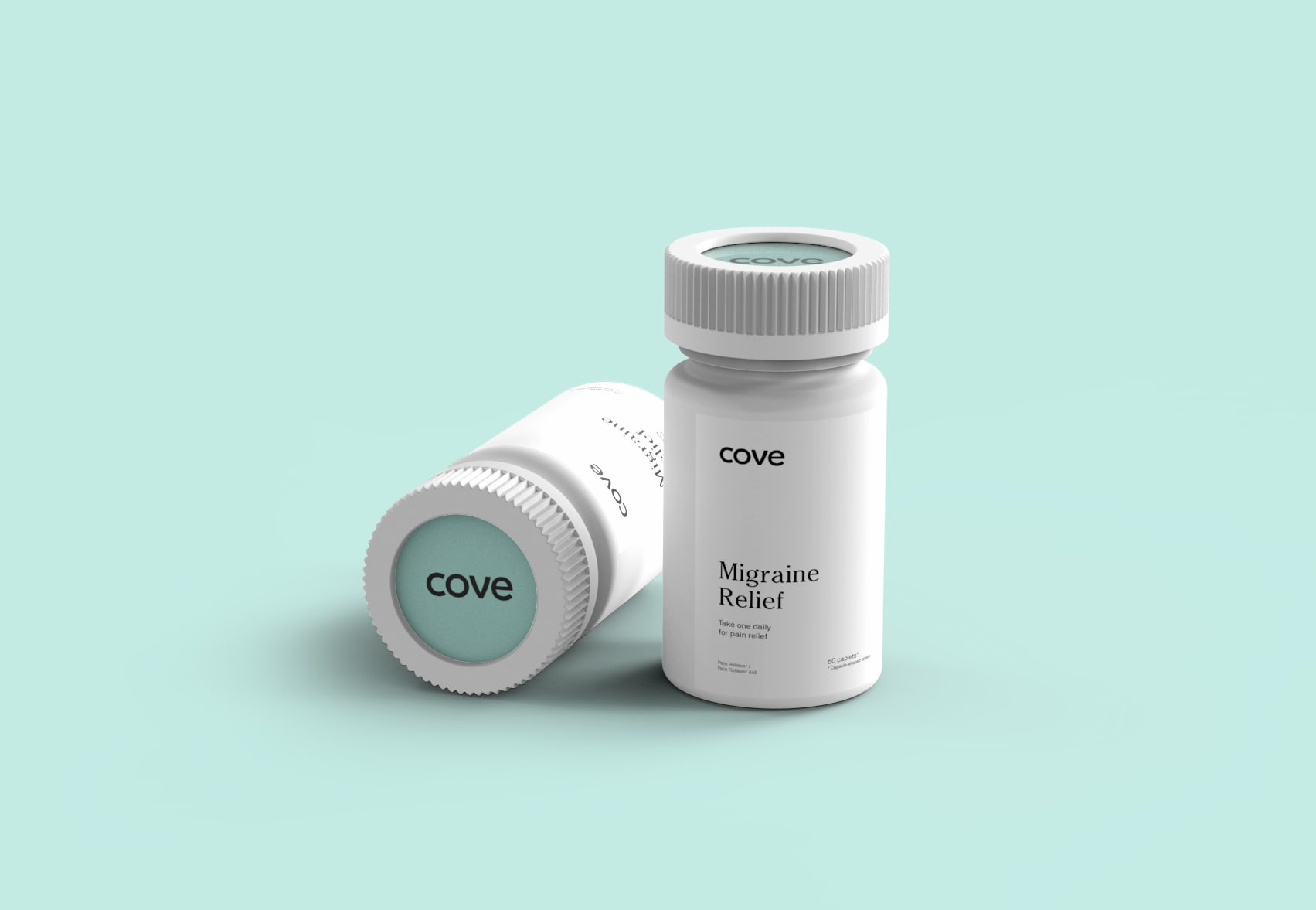If you’ve been dealing with headaches for a while, you probably know that dehydration is a common trigger. Maybe you’re even making an effort to drink more water. Even so, drinking more water isn’t always enough to make up for the fluids your body naturally loses throughout the day if you’re a migraine sufferer. Many people also need to replenish their electrolytes, which is a fancy word for minerals like sodium, calcium, and potassium that help regulate key functions in your body.
So, how do you get those electrolytes? There are lots of ways, and some people’s minds jump right to sports drinks. However, those often contain a lot of sugar, which as you probably also know, is a migraine trigger. That’s why Cove developed Oasis in partnership with leading neurologists; it’s a dissolvable power that provides you with electrolytes that can help manage migraine attacks.
Interested in trying Oasis? You can get started here.
What is Oasis?
Oasis is a hydration mix made with balanced electrolytes, vitamins, and minerals designed for migraine sufferers and their unique hydration needs. It contains a variety of active ingredients, including:
- magnesium
- sodium
- potassium
- calcium
- Vitamins C, B6, and B12
Here’s how these all play a role in reducing your migraine frequency:
How do electrolytes prevent migraine attacks?
Electrolytes are responsible for maintaining the fluid levels in your body. If you don’t have the right balance of electrolytes in your body, you aren’t able to retain enough water and can then get dehydrated—which can then trigger a migraine attack. The main way you lose electrolytes is through bodily fluids like sweat, which is why you typically hear people talking about them in the context of exercise (and why you can get a migraine headache from exercising).
There’s also data that suggests adding certain electrolytes to your diet can reduce the number of migraine attacks you experience. Those include magnesium, sodium, and calcium, all of which are present in Oasis.
How do supplements prevent migraine attacks?
There are a variety of migraine supplements that may reduce the frequency or severity of your attacks, and some have more science behind them than others.
One supplement that has been effective in reducing migraine frequency in multiple clinical trials is magnesium. Most adults in the U.S. aren’t getting enough magnesium from their diets, and migraine sufferers are especially likely to not get enough. Oasis contains 100 mg of magnesium to help correct that imbalance.
Other supplements you can take for migraine prevention include Coenzyme Q10 and various vitamins.
How do vitamins prevent migraine attacks?
You may have heard of riboflavin (a.k.a. Vitamin B2), which has been shown to reduce the number of attacks migraine sufferers experience when taken at a high enough dose. Riboflavin helps your cells function properly by keeping energy production running smoothly.
Several other B-vitamins may have a beneficial effect for migraine sufferers, including Vitamins B6 and B12 which are present in Oasis. How they do this is a little complicated, but scientists think it has to do with having enough vitamins in your body to break down certain amino acids. Vitamin B6 may also work against nausea, if that’s something you experience with migraine.
While Vitamin C hasn’t been studied specifically for migraine, it has been effective in treating other neuroinflammatory disorders, so scientists believe it may be beneficial for migraine sufferers as well.
How do I take electrolyte supplements like Oasis?
Hydration supplements like Oasis come in a powder form that you can mix into water and then drink. You’ll want to take it every day to get the full benefit, so it comes in daily packets. All you need to do is:
- Mix one packet of Oasis into 16 oz of water (that’s how much is in a standard-sized water bottle).
- Drink it—right away, when you’re feeling parched, or slowly throughout the day. It’s up to you.
Why should I take Oasis instead of taking vitamins separately?
Convenience! According to Cove Medical Advisor and neurologist Dr. Alexander Mauskop, “Research shows that people are less likely to stick with a treatment plan if they have to take multiple pills at once, or have to take a treatment more than once a day. Oasis has seven active ingredients, so that can really make a difference.”
He also says, “Some studies suggest that powder supplements are easier for your body to absorb than solid tablets.”
Is there sugar in Oasis?
Nope! Oasis is sweetened with stevia, a natural sugar substitute derived from the leaves of the stevia plant. That can be important if changes in your blood sugar levels tend to trigger migraine attacks for you.
How long will it take for Oasis to start working for me?
It depends. How deficient you are in each vitamin or mineral, the cause of your deficiency in the first place, and a variety of other factors unique to your body can all make an impact on how long it takes to start seeing positive effects from Oasis. While it won’t happen overnight, the American Migraine Foundation says taking a product like Oasis daily can start showing results in two to three months.
If I stop taking Oasis, will my migraine attacks get worse?
You should always talk to your medical provider if you’re concerned about the effects of starting or stopping a supplement. In general, though, if you continue to make sure you stay hydrated and get the right electrolytes in your diet, you’re unlikely to see your migraine symptoms worsen if you stop using this type of hydration supplement.
So where does that leave you? If you’re a migraine sufferer who has trouble remembering to stay hydrated, or you think you could stand to boost your electrolytes, you can give Oasis a try. Oasis is an over-the-counter supplement so you don’t need to get a prescription first, and hydration can make a world of difference when it comes to living more comfortably with migraine.
If you want to check out what other supplements make sense to take as a migraine sufferer, we have a guide for that too.
The information provided in this article is not a substitute for professional medical advice, diagnosis, or treatment. You should not rely upon the content provided in this article for specific medical advice. If you have any questions or concerns, please talk to your medical provider.
These statements have not been evaluated by the FDA. This product is not intended to diagnose, treat, cure, or prevent any disease.


